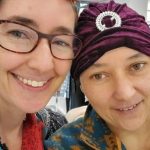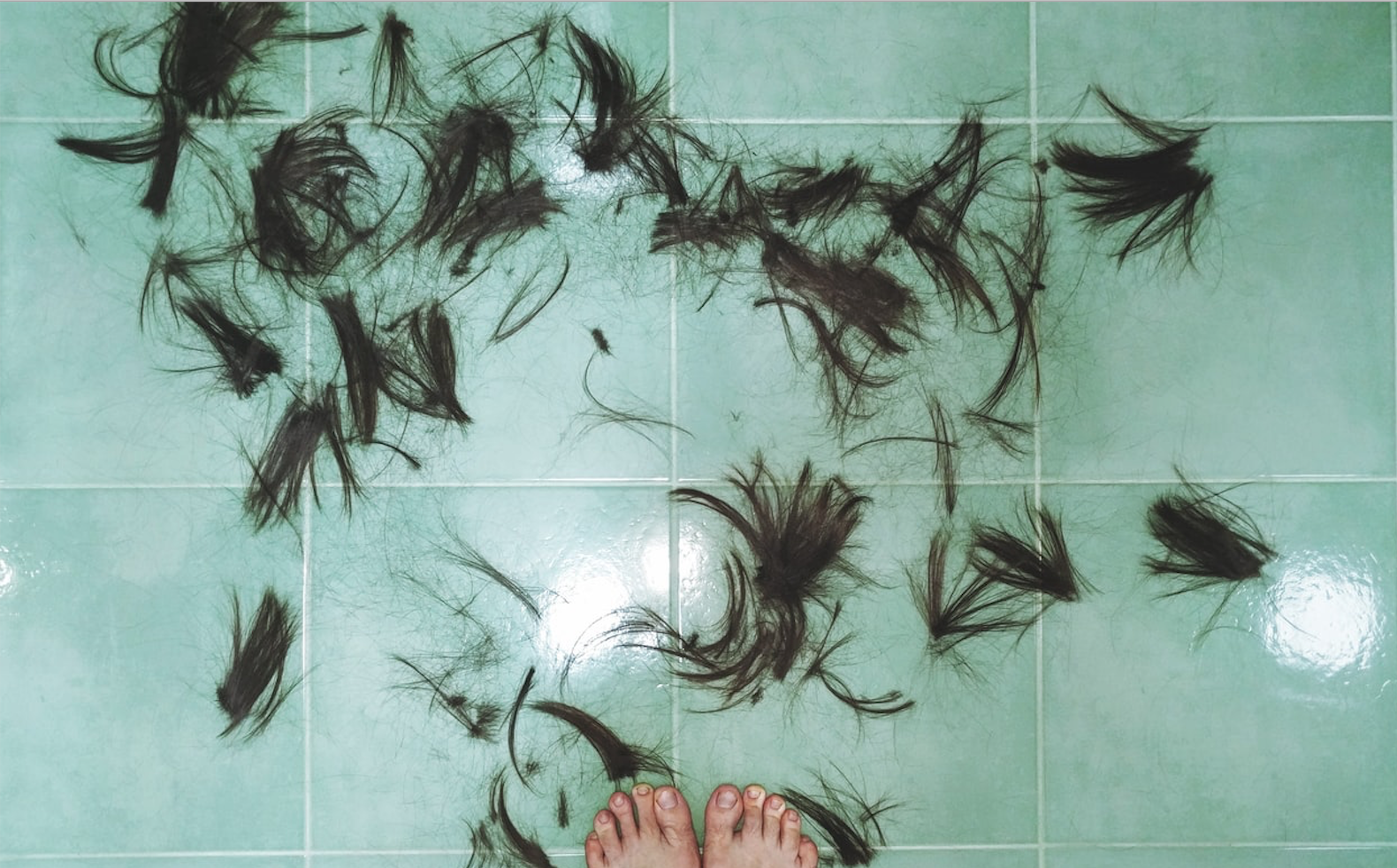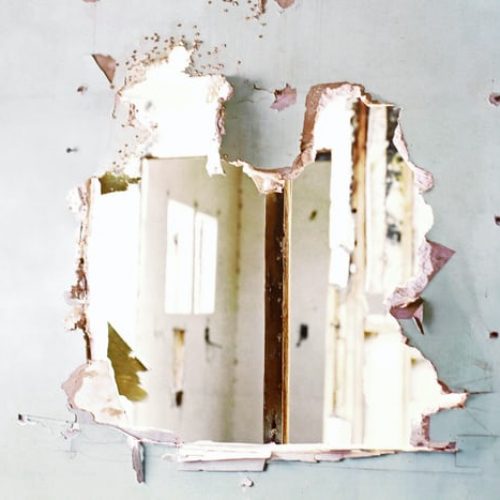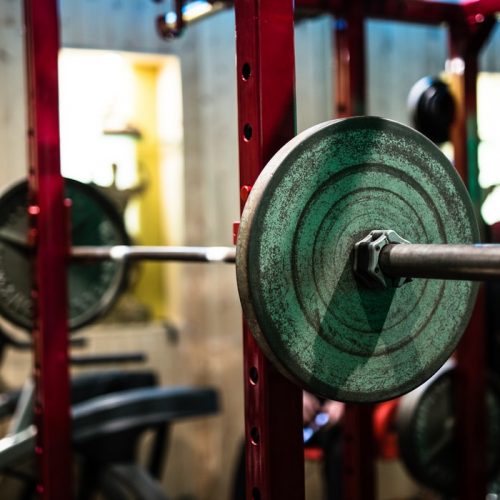I asked the stylist to buzz cut my hair from the roots. He patiently made more than ten braids, using rubber bands at both ends to keep the hair from unraveling. He would donate them to be made into a wig for cancer patients.
My dark brown hair reached down my back. It had turned blonde at the ends from years in the Texas sun. Highlights shone throughout its density.
I looked at the reflection of my sister standing next to me. Her jet-black hair was buzz cut; there were bald spots where her hair had already fallen out from her chemotherapy treatments. My beautiful sister with her dark almond shaped eyes, so beautiful with or without hair. She smiled nervously at me, her jaw quivering.
My mother called my sister, begging her to tell me not to do it. My sister asked, “Are you sure?” many times through the braiding process. I could not have stopped the stylist. There was no going back.
The male stylist had long hair, brushed and coiffed. He was a beautician; I was asking him to make me ugly. Despite his silky hair, he was thin and looked like he had not eaten his last few meals. He was doing this for free, as the salon he worked for donated free buzz cuts for cancer.
The clock ticked past lunchtime. None of us had eaten. “Are you sure?” my sister asked again.
“I don’t even brush my hair,” I said. “It makes the back of my neck sweat.” “It will be so easy to take care of.”
I wanted my sister to believe that my hair was not precious to me, that I would not mourn the loss of it, that I loved the ritual of cutting it every few years to give away to prove that I was not vain.
In the doctor’s office, the surgeon explains the process of breast reconstruction to my sister. He can take a bit of fat from my sister’s abdomen to fill the absence of flesh after my sister’s breast is removed.
My mother says, “We are not vain people.” She replies for my sister, my sister tells me later that day.
But my sister likes the before and after photos, the arch of the new breast, how supple and fresh it looks. She will not want to look lopsided or asymmetrical. She will not want to feel imbalanced. She will not want to be reminded of the cancer, the surgery to come, the chemo, the radiation, all still to take place throughout the rest of this year. She wants to look forward to those photos of perfect breasts. She wants them to be her own.
She does not admit this at first; that would mean that she is what my mother says we are not.
What we do not know is that in the months to come, my sister will develop an infection after her mastectomy. She will be readmitted to the hospital for one, two, four, then five days. We are not allowed to visit, because of the coronavirus precautions. Her left chest sunken in, she loses hope in a future surgery. But the surgeon has saved her nipple; it rests against her bare chest wall. It is a beautiful, round piece of living flesh, a peaked puzzle piece, a connection to her dream of a resurrected breast.
On the phone, I ask if it would help if she had her drawing pad and some of her pencils. My sister has been an artist since she was two years old and began drawing a mural on her bedroom walls with crayons. She has been painting and sculpting as long as I can remember. Is it too much to say that for an artist, beauty is as important as honesty and truth? Beauty is not a vanity, but a necessity. Once, my sister told me that symmetry is one aspect of beauty, but that no one is truly symmetrical. We all have one ear, one eye, one breast larger than the other. What I realize now, is that our conceptions of beauty may change, not our need for it. My sister will later undergo thirty rounds of radiation which will burn the skin around her breast.
It doesn’t matter that I don’t wear makeup or don’t have hair. Not when my sister is suffering this way. It doesn’t matter that I wear the same clothes I have owned for decades, bought for me by others. There were many days as a young mother when I did not look in the mirror. Not being vain has been a source of pride for me. Pretending not to care about my looks has been my vanity. But none of this matters in the face of my sister’s cancer. It is a vanity that I am even writing about it.
My sister will tell my mother, “You said you wanted to cut your hair for me, but you didn’t. You, with your long blonde tresses. You who say you are not vain.”
My mom will try to explain that she doesn’t want my sister to go through more surgery just for reconstruction. She cannot say anything else. My sister is right. I wouldn’t want my mother to cut off her hair. She would suffer too much. Her hair masks the wrinkles around her face, softens her jawline and hides the extended veins when she is angry, her furrowed brow when she is sad, creating a golden aura around her body. Her hair makes her blue eyes sparkle even more. In her forties, she enjoyed hearing strangers tell her she looked like a teenager. Now in her sixties, my mother has an outfit for every day. She is a fashionable pianist, who has made it her business to make beauty both visible and audible.
Each time I see her, my mother says, “We have to do something about your hair,” with a look of pity. “Why does it stick up so much? Why won’t it lay down?”
I tell her that I don’t want it to lay down. I am a punk-rocker.
Secretly, I am grateful that I can position the laptop screen so my violin students cannot see the top of my hair in all its spiky, puffy glory. That I can wear hats when I go out, that this quarantine allows me to hide. I am grateful that my husband doesn’t seem to mind, though he says I look like Woody Allen in the beginning, then a prisoner of war. Later, he changes it to Annie Lennox. Then Don King. I am androgynous.
I pretend these comparisons don’t bother me. It isn’t that I don’t wish to be beautiful. But in what way? I look at photos of breast cancer survivors smiling shirtless without breasts. They are happy to be alive. Their scars are beautiful. I don’t even appreciate the breasts I have. I do not touch them, marvel at them, notice how the nipples are still supple after four decades of life, after four years of breastfeeding my daughters.
In ignoring her own body, my sister’s cancer grew. In dismissing her tumor for more than a year, she had dismissed herself. She had stopped looking at herself.
In place of my body, I have focused on the shape and timbre of words and music––the peak of a phrase, an accent, a sudden forte; I have rewritten sentences with an eye towards symmetry, towards beauty. My sister has lost her breast and mourns it and I do not acknowledge the presence of my own breasts. I realize this is a purposeful denial, my own missing piece that makes me less whole.
My sister is the one who taught me to look at myself, at the world, not just write about it. Growing up, she often looked in the mirror for long periods, studying the shapes and forms of her face and body, before drawing self-portraits.
My sister made a purpose, an intention out of seeing. She was her own model. Her anatomy was her subject, her classroom. She told me, if you can see it, you can draw it. She convinced me that anyone can draw anything and made me practice. As a teenager, when I drew a butterfly that I found withered away on the sidewalk, it came alive on the page. Seeing, then drawing, had brought life back from death.
How can words match that? How do words fulfill my need for beauty, for life? Seeing, then writing, is my “vanity.” Through writing, I see more clearly. I cannot see until I write. Perhaps vanity is not a sin, but a virtue, not a shame, but a truth revealed, not a shadow but a self who does not hide or ignore her vision, her feelings, her own life force.

Elizabeth Marquis~Mayorca
Elizabeth Marquis~Mayorca is a writer/violin teacher from Cypress, Texas. She graduated with an MFA in creative nonfiction/poetry from the Vermont College of Fine Arts and a BFA in Dramatic Writing from NYU where she received the Rod Marriot Playwriting Award. Her most recent publication, "I Thought You Italian Girls Were Supposed to be Sexy," can be found in Ovunque Siamo:New Italian-American Writing. Elizabeth is currently writing a book about her relationship with her New York-born Calabrese grandmother.





